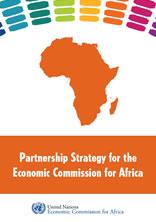Partnership Strategy for the Economic Commission for Africa

The recent refocusing exercise aimed, among other things, at making the Commission the “think tank” of reference on African development policy issues by building on the Commission’s comparative advantage and by placing particular emphasis on: i) the rigour and relevance of knowledge produced by the Commission; ii) generating knowledge underpinned by robust statistics; and iii) improving the packaging and communication of ECA knowledge products to core policy constituents. ECA delivers on its mandate under the umbrella of two overarching pillars, namely policy research and knowledge delivery. The delivery mechanism of the Commission’s normative work remains policy research to generate knowledge, advocacy and consensus-building, as well as advisory services and technical cooperation.
One key feature of the recent ECA repositioning and recalibration of its programmes is the greater specialization and focus in core areas of comparative advantage, where the Commission can make a real difference to Africa’s transformative agenda. This can only be achieved, inter alia, by pooling resources to make meaningful impact in the Commission’s niche area of knowledge production, knowledge dissemination and policy advocacy; and by building synergies and strengthening its collaboration with critical actors both within and outside the continent.
To this end, the Commission developed a new Partnership Strategy with a view to enhancing complementarity and development impact and to responding better to the evolving needs of its member States within the context of new and emerging opportunities and challenges. The Strategy is framed on the premise that Africa’s development challenges and its transformative agenda are so huge that no single institution or organization, no matter how well-resourced, is capable of addressing them alone. The new approach to partnerships intends to forge more strategic and results-based collaborative alliances with its hallmark view of partnerships beyond mobilization of financial resource to include sharing of ideas and knowledge, developing synergies, building on comparative advantages and avoiding duplication of efforts. The new Strategy will serve as a guide for ECA substantive Divisions and Sub-Regional Offices in their efforts to build and nurture partnerships for effective programme delivery.